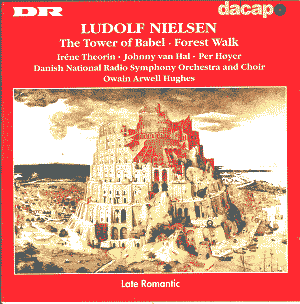Ludolf NIELSEN
(1876-1939)
Babelstarnet, Op. 35 (The Tower of Babel)
(1912-14)
Skovvandring, Op. 40 (Forest Walk)
(1922)
 Iréne Theorin
(sop) - Voice of a bird
Iréne Theorin
(sop) - Voice of a bird
Johnny van Hal (ten) - tenor solo
Per Høyer (bar) - Human Voice
Danish National Radio SO/Owain Arwel Hughes
co-production with Danmarks Radio
rec 1-3 Oct 1999, Danish Radio Concert Hall,
Copenhagen
 DACAPO 8.224157 [63.05]
DDD
DACAPO 8.224157 [63.05]
DDD
Crotchet AmazonUK
AmazonUS
Amazon
recommendations

Almost contemporary with his more famous namesake Carl Nielsen, the younger
(by 10 years) Ludolf was also a country boy made good, educated at the Academy
of Music, played in the Tivoli Orchestra, and established his own string
quartet. He then won a scholarship to study in Leipzig where he resided for
two years. Whilst in Leipzig he made contact with the music publishers Breitkopf
and Härtel who he persuaded to publish his two string quartets. Upon
his return to Copenhagen he established himself as composer and teacher and
then spent the rest of his life like this. Towards the end of his life he
was employed by Danish Radio and he there composed incidental music for plays
etc. He died at the age of 63.
His symphonic poem The Tower of Babel is more an oratorio rather
than a tone poem, using as it does a large choir and orchestra with soloists,
based upon the story of the Tower of Babel in Genesis Chapter 11. Working
with the poet Gyrithe Lemch he developed the story, adding to it to produce
the idea that mankind may be saved by the power of the spirit. With these
high minded thoughts and the fact that other Danish composers such as Langgaard
and Glass held similar ideas and were trying to work these out through their
music, the start of the First World War, which coincided with Nielsen's
completion of The Tower of Babel, must have come as a rude awakening.
More conservative than his slightly older namesake, the music is not compromised
by this. The Tower of Babel is an extremely attractive and dynamic work,
and has a sweep about it which truly enhances its overpoweringly triumphant
conclusion. The forces are organised conventionally apart from a group of
male voices and brass instruments set aside from the main forces to represent
the voice of God makes for a very impressive sound picture.
The singers, mainly natural Danish speaking artists, all currently performing
at the Royal Danish Opera. The voices blend beautifully and all sing with
passion and commitment and the interplay between choir and soloists is first
class.
The second work on the disc (Forest Walk) is purely orchestral,
is in five sections and is based upon scenes from Greek Mythology. The first
scene is based upon Echo and Narcissus, the second, Pan Walks the Forest.
The third scene is called The Death of the Dryad, the fourth By the Elf Marsh
and the final scene Towards Daybreak.
The style of the work is inspired by French impressionist writing such as
Debussy's L'apres midi, Ravel's Daphnis et Chloe, plus other
Scandinavian works of the time such as Sibelius's Pan and Echo, Launy
Grøndahl's Pan and Syrinx, Carl Nielsen's Pan and Syrinx,
C.F.E. Horneman's The Contest with the Muses as well as others. I
liked it very much and can recommend it warmly to you.
The playing of the orchestra, Denmark's premiere ensemble is everything which
one would expect, and the recording, made in the orchestra's home is clear
and very true. The recording has been made by Dacapo in conjunction with
Danish Radio and it is hoped that there will be more of this repertoire recorded
for our pleasure.
John Phillips
See also Review by Rob Barnett

